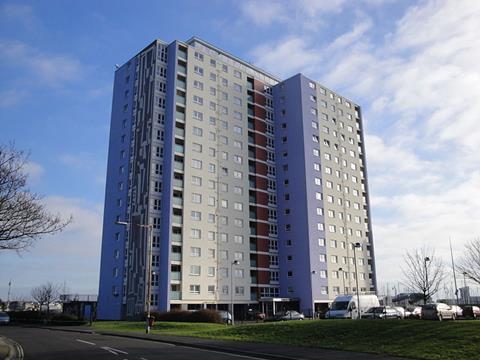Mulalley facing potential bill of £8m over dispute on Portsmouth towers
A specialist housing contractor has been told to pay damages to the owner of a set of Portsmouth towers in the first High Court judgment on fire safety defects in high-rise cladding since the Grenfell Tower disaster.
Housing association Martlet Homes, part of Hyde Housing, had made the claim against Mulalley over cladding works it completed on Gosport Towers.
In a judgement handed down last Thursday at the Technology and Construction Court, Judge Stephen Davies found that Mulalley had breached its contract in both its specification of cladding and its installation of the system, which was found to be defective.

He awarded Martlet damages for both the remedial works it undertook to fix defects and the costs of the waking watch service implemented by the housing association while works were carried out.
The full value of the damages has yet to be determined but Martlet’s initial claim was for around £8m.
The decision could have huge ramifications over who pays up to fix cladding deemed faulty in the wake of the Grenfell Tower tragedy five years ago.
In April, the executive chair of the Home Builders Federation, Stewart Baseley, said more of the industry had to help pay for the repair work.
He said: “I think other actors who are equally involved in this - construction product manufacturers, contractors, freeholders, overseas developers. We would like to see [then secretary of state for housing Michael] Gove use the same energy to go after some of the other actors.”
Essex-based Mulalley began work on the 440-homes Gosport Towers complex in 2005, completing work for then client Kelsey Housing Association three years later before Martlet bought the buildings.
Following the Grenfell fire, an investigation by the housing association found that the cladding material included combustible material, along with “defects in the installation of the fire barriers which created a real risk that they would not operate as intended to prevent the spread of fire”.
Martlet set up a regular fire patrol – the so-called waking watch – and in November 2017 decided to remove the entire EWI cladding system and replace it with stone wool insulation panels.
These works were carried out by contractor Axis between 2018 and 2020, during which time the waking watch was maintained.
Mulalley was first notified of a potential claim in August 2017 and the housing association eventually took the case to the High Court after an adjudicator found against it in 2019.
The case concerned four of the towers, with Martlet claiming damages for the cost of replacing the cladding system as well as the cost of the waking watch.
While Mulalley admitted some installation defects, the firm’s lawyers questioned their extent and disputed some of their relevance for fire safety purposes. It also contended that only a limited repair scheme was necessary to fix the faulty installations and that, since Martlet chose to replace rather than repair, the costs were not recoverable.
On the back of evidence from architectural and fire engineering experts, the judge concluded the defective installation of the fire barriers meant the works, as built, did not comply with building regulations or BRE guidance.
Adhesive dabs applied by the contractor left a gap between the fire barrier and the wall, negating its effectiveness, which judge Davies wrote was “clearly a very serious breach”, given the fire safety strategy assumed that these barriers would restrict the spread of fire across the block’s exterior.
Judge Davies’ decision stated that, had Martlet only succeeded on the installation breach case, it could only have recovered the costs of a repair scheme.
But he found that Mulalley had failed in its specification of the StoTherm cladding system, having been unable to demonstrate that it passed fire safety tests recommended in the contemporary building regulations.
On this basis, he said Martlet could recover the costs of its replacement scheme as well as its claim for the costs of the waking watch, “subject to some relatively modest reductions”.




























No comments yet